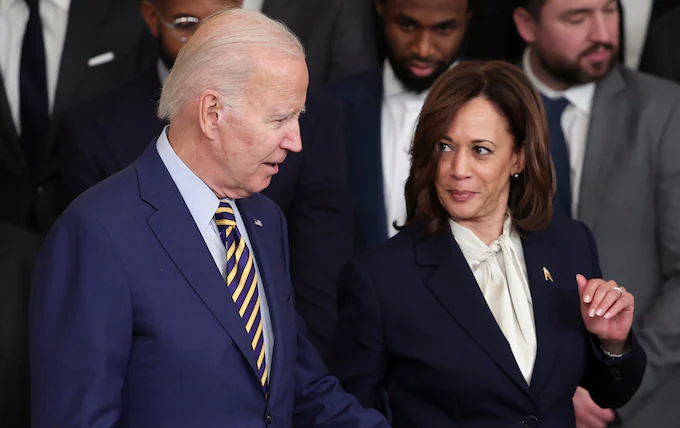Top aides to former President Joe Biden privately urged major donors not to support replacing him with his chosen vice president, warning it would be a serious “mistake,” according to excerpts from an upcoming book previewed by The Guardian on Thursday.
The book, “Fight: Inside the Wildest Battle for the White House,” by NBC News’ Jonathan Allen and The Hill’s Amie Parnes, reveals how Biden’s team “aggressively” lobbied top Democratic donors to stick with the president as he fought to salvage his candidacy in the summer of 2024. In the wake of Biden’s disastrous debate performance in late June, the book details internal efforts to cast doubt on Vice President Kamala Harris’s viability as a replacement, as part of a desperate push to retain the nomination.
As pressure rose on Biden to step away from his reelection bid following the debate, Biden aides “frantically push[ed] back in phone calls and in text messages, accusing donors of promoting their own agendas at the expense of Biden, the party, and the country,” Allen and Parnes write in their book. “It all sounded like a serial killer’s conspiracy theory,” the authors write, before switching to italics to denote the thoughts and descriptions of sources who spoke to them about their own internal thoughts and private discussions:
“‘Donors want to scrap Biden so they can get his wannabe replacements – the governors, with power over state decisions – to beg them for cash,’ Biden aides argued. ‘This isn’t fucking Wall Street financiers versus Ivy League presidents. Our guy isn’t scared of your money. We have grassroots donors. We have the support of the voters. We have the nomination in hand. All you’re doing is f**king yourself and the president. We will remember this. Capisce?’”
“The last threat, the ace in the hole, was Kamala Harris,” the authors wrote. “Even if Biden did drop out and you got your dreamed-up open convention, you would only succeed in nominating the vice-president. Is that what you want? You want her? Look at her polling. No one wants her. Forget it. It’s never gonna happen.”
In the weeks following his historically poor debate performance, Biden’s aides and allies continued to argue that he remained capable of winning the general election. They emphasized that he was the only Democrat who had previously defeated President Donald Trump—and could do it again. Despite their efforts, Biden ultimately exited the race on July 21, facing a fundraising freeze and mounting public pressure from Democratic leaders and party insiders to step aside.
Shortly after announcing that he would step aside, Biden released a statement giving Harris his “full support and endorsement.” When Biden first picked Harris as his running mate in the 2020 race, he stated that he considered her to be “the best person to help me take this fight to Trump and Mike Pence and then to lead this nation.”
After securing the nomination, Harris positioned herself as a fresh face and a unifying force, promising to usher in a new era of politics centered on optimism and change. However, when pressed on how her policies might differ from Biden’s unpopular agenda, she declined to offer any clear distinctions. Her decision to select Democratic Minnesota Gov. Tim Walz as her running mate—likely aimed at boosting support among male voters—appears to have backfired. Walz made a series of high-profile missteps on the campaign trail, while young male voters turned out in large numbers for Trump on Election Day.
The book also reveals that several of the most influential figures in Democratic politics—including former President Barack Obama and Rep. Nancy Pelosi—had serious reservations about immediately backing Kamala Harris. According to one source who spoke with Pelosi on the night of Biden’s disastrous debate against Trump, the House Speaker expressed concern as she watched the president struggle on stage, reportedly saying, “Oh my God, it’s going to be her.”
According to excerpts reviewed by The Guardian, Harris felt snubbed by former President Barack Obama as she sought his endorsement and backing to become the Democratic nominee. The vice president had never developed a particularly close relationship with Barack or Michelle Obama, a dynamic that reportedly began in 2009 when she was denied access to a VIP area at a party celebrating Obama’s 2008 election victory.



